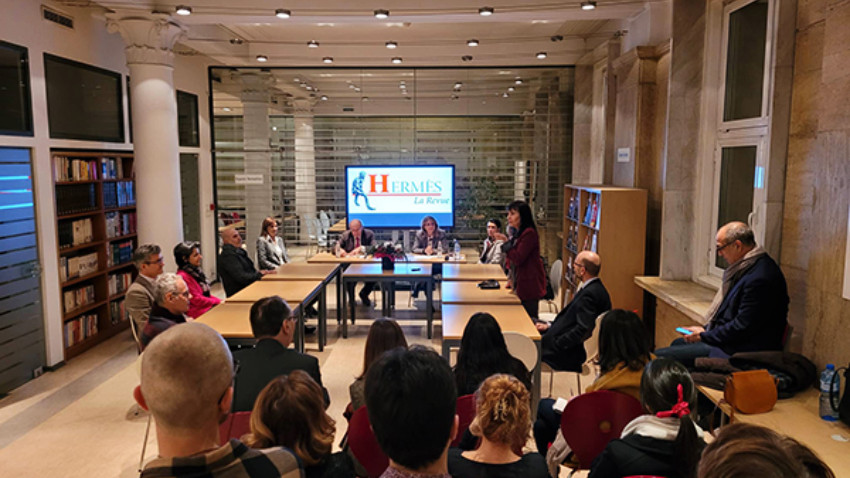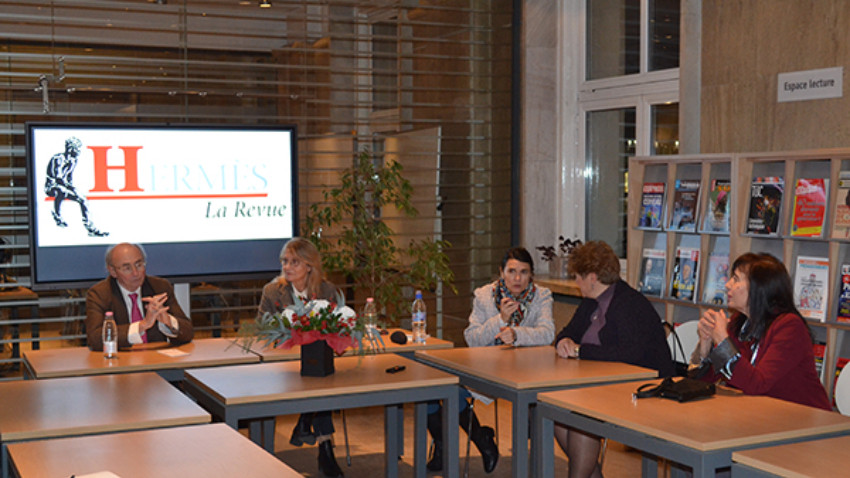Dominique Wolton, a French sociologist and author with an impressive body of work in the sphere of communications, technologies, globalism, the building of Europe and cultural diversity, paid a visit to Bulgaria for the opening of the Bulgarian office of the HERMES science journal, which he founded in 1988 and is director of to this day. In Wolton’s words, during its 35-year long history, the journal has been endeavouring to subject communication to interdispilinary analysis, in its connectedness with humans, technologies, cultures and societies, with 2,000 authors contributing over the years. At open lectures at the St. Kliment Ohridski University in Sofia, Dominique Wolton presented his ideas on communication as a constant process of negotiation, immeasurably more complex than information, regardless of the speed of technologies.

In an interview with Radio Bulgaria, Dominique Wolton explained the meaning of the term invented by him “incommunication” – a prerequisite for coexistence, as opposed to both communication and acommunication – a radical rejection of communication that can only lead to war and violence.
The communication among us largely hinges on stereotypes:
“A stereotype is a caricature of the person one is talking to, an obstacle to communication, yet without stereotypes I cannot start talking to the other person because they resemble me,” Wolton explains.
Officialese, riddled as it is with clichés, is no less complex, it is false, yet it is an indirect way we can talk to one another and is essential to dialogue. “Stereotypes, officialese need to be criticized, but we mustn’t be so naïve as to think we can talk to each other freely.”
So, how is the dialogue between Eastern and Western Europe coming along?
“Communism split Europe in half. During the 60 years of communism, in Western Europe there was freedom and democracy. It seems to me that the unification of 1990 didn’t go well, because East Europeans didn’t fully understand what was going on in the West. And, most of all, Western Europe was not curious enough about what Eastern Europe had done and its resistance against communism. Both sides need to make an effort – Eastern Europe to comprehend that its history is different, and we in Western Europe to understand the history of Eastern Europe and to not be so arrogant.”
Dominique Wolton, whose own works have been translated into 23 languages, believes that diversity of languages is vital and that the translator is a “facilitator of differences”. The multiplicity of languages is, in effect, the biggest political battle, alongside the environment, because it underlies cultural diversity. Native languages need to be preserved, and unless they are, over time this will engender ideological and political conflicts.

United Europe, which is part of this complicated environment, is a Utopia, Dominique Wolton believes. “A map of the world that does not include Utopia is not worth even glancing at,” Oscar Wilde says, but isn’t there a paradox here because what makes a Utopia utopian is that it does not exist?
“That is true,” the French sociologist replies. “Utopia does not exist but it makes human progress possible. Europe is a case in point. There are 27 countries, we are not very fond of each other, we have our disputes and violent history, yet we are trying to build a community, and we are succeeding. The lesson we are being taught is humbling – we are building it even though we do not get along. At the same time, it is teaching us an incredible lesson about utopias, because despite the difficult communication, we are still capable of talking to one another and doing something together. In politics, Utopia is essential.”
Photos: uni-sofia.bg
Kosovo is heading for early elections after nine months of failed attempts to form a government Kosovo President Vjosa Osmani has dissolved Parliament, Koha Ditore reports. This decision came after the proposed cabinet, put forward by Glauk..
Bulgaria celebrates National Reading Day on the third Friday of November. The Reading Foundation is leading the initiative under the motto: “Read. For Real”. According to the OECD's PISA 2022 study, 53% of 15-year-old students in Bulgaria have..
On November 21–22, 2025, the 11th edition of the Career Fair will take place at the John Atanasov Hall in Sofia Tech Park. The forum aims to support early career orientation for young people in Bulgaria and is organized by the Bulgarian Global..
From fear and doubts to joy and support – Bulgarians react differently to the upcoming introduction of the euro on January 1, 2026. For..
On the eve of Christian Family Day, 21 November, dozens of couples from Dimitrovgrad renewed their wedding vows after spending more than half a century..
Teodora Byalkova joined the Bulgarian Sunday school "Sts. Cyril and Methodius" in Athens in the 2022/23 school year. At that time, she..

+359 2 9336 661
